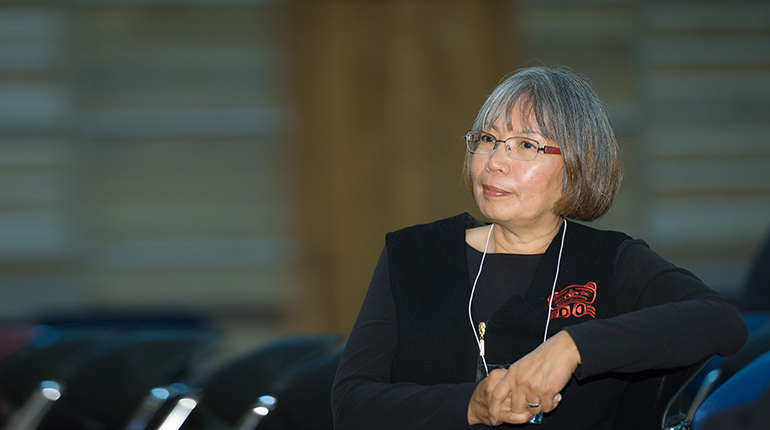Jo-ann Archibald is honoured by the American Educational Research Association.
Jo-ann Archibald, a member of the Sto:lo Nation, has helped transform Indigenous education in Canada. This spring, the American Educational Research Association (AERA) recognized Archibald’s contributions to her field with the Scholars of Color Distinguished Career Contribution Award for 2013. As the Faculty of Education’s associate dean for Indigenous education, Archibald spearheaded the Year of Indigenous Education initiative. And with June being National Aboriginal History month, UBC News felt it fitting to discuss her work.
Q: The AERA recognized the contributions you’ve made throughout your career. What are you most proud of?
I’m proud that I have been involved in creating meaningful space within the academic area for learning about Indigenous education and for ensuring that the university addresses the educational and research needs articulated by Indigenous communities.
We have close to 30 Aboriginal students currently enrolled in doctoral programs in the Faculty of Education.
We’ve done great work in the area of teacher education. For example, one program, NITEP (Native Indian Teacher Education Program) has been running for 38 years – I’ve been working with the program for 23 years. Since it started, 366 students have graduated and gone on to work either in their communities or others.
Now more and more students are interested in doctoral programs. We have close to 30 Aboriginal students currently enrolled in doctoral programs in the Faculty of Education. To create this type of momentum, you have to make programmatic space, you have to find funding for students, and you have to hire Indigenous faculty members. It’s a systematic change but it results in more people who are teaching and doing research on Indigenous education.
Q: In your role at UBC, how do you work with communities?
We want to address the educational needs of communities. I worked on a research project with Cynthia Nicol, a faculty member, about teaching culturally responsive math in Haida Gwaii. It brought together elders, artists and teachers. Artists talked about how math is a part of their designs and how they use math is their wood carvings. We were able to show the intimate connection between math, culture, and community.
UBC is located on the traditional and unceded territory of the Musqueam people and we’ve been working closely with Musqueam on a couple of events that are part of the Year of Indigenous Education. Dean Blye Frank has created an annual Musqueam Excellence in Education keynote address, which will continue the process of educational sharing and dialogue.
Q: What were some of the highlights from the Year of Indigenous Education?
Since September, we held 28 events and close to 3,000 people have participated in them.
As part of the Year of Indigenous Education, we held a Math K-12 symposium. This is our third year holding the symposium but in past years, there have only been about two-dozen participants. This year we had 150 educators from around the province. We asked teachers to share their success stories and provide examples of how they incorporated culture and math as educators. Then we set up a blog where they could continue the discussion. This has sparked a network of educators all talking about this subject.
The Year of Indigenous Education acts a catalyst for an area where there hasn’t been much success. We wanted to look at those programs and methods that have been successful, highlight them and build on those successes so that others can incorporate them into their work too. Educational resources have been developed through the Year of Indigenous Education projects and events.
Q: This September, the Truth and Reconciliation Commission of Canada will hold its last national event on the West Coast. UBC is suspending classes on Sept. 18 so that faculty and students can participate in the event and increase their awareness and understanding of the Indian Residential School system. What does this day mean for you?
This is about wider societal recognition of the legacy of residential schools. It’s important that Teacher Education candidates understand the impact these schools had on Aboriginal people, the intergenerational impact and its broader affects on Canadian society. They need to think about how they can continue to ensure that we don’t impose cultural and other forms of suppression again. They need to create awareness about how the past influences us today.
We’re planning an event around that time about the Inuit Residential School Project. Educators from Nunavut will visit us at UBC and share what they’ve learned about the impacts of the Inuit Residential Schools and how they have developed school curriculum on this topic.
Q: Where is Aboriginal education moving?
I think there will be more Indigenous people in faculties, post-secondary education institutions and community colleges. I think we’ll also see more Indigenous people in key leadership roles in the school districts. When Indigenous people can make policy changes and funding decisions, that’s where we’ll see systemic change being made. Indigenous people in leadership can ensure others are addressing Indigenous education in meaningful and significant ways. Our Faculty of Education will continue to play important educational and research roles to prepare educators to make a difference in Aboriginal education.

